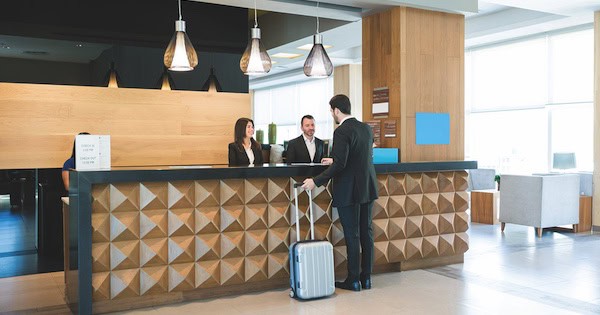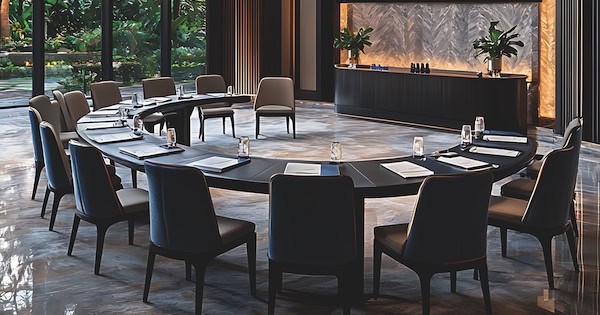What Offices Can Learn From The Best Hotels

What makes a great hotel stay memorable? It’s probably not just the plush bedding or concierge service. It’s the way everything works together—the space, the service, the attention to detail—to make guests feel comfortable, cared for, and valued.
That same harmony is driving a new approach to facilities management as forward-thinking organizations draw inspiration from hospitality. They’re recognizing that from the moment someone walks through the door, every detail — air quality, lighting, food, technology, cleanliness — shapes how that person feels, performs and connects.
With a hospitality mindset, facilities management stops being a behind-the-scenes function. It becomes a front-line strategy for creating spaces people want to be in — spaces that energize teams, impress clients and reinforce culture.
Rethinking Facilities As Experience Infrastructure
Facility management is the foundation of the workplace experience. When spaces run smoothly, it fades into the background. When they falter, everyone notices. That’s why it’s important to see every aspect of facility services — engineering, cleaning, food service — not as a support function, but as a guest-facing one.
In hospitality, friction is designed out from the start. Guests walk in expecting everything to work — and to be fixed quickly if it doesn’t. That same thinking applies to the workplace: a messy restroom, uncomfortably warm meeting room or empty pantry can disrupt productivity, mood, and momentum.
The difference is in the details. A hospitality-informed facilities team anticipates issues before they happen and resolves problems before they ripple out. Engineers keep building systems humming. Custodial teams uphold comfort and cleanliness. Culinary teams fuel focus and connection.
Together, they form a connected ecosystem that shapes how people experience the workplace. The emotional impact may be subtle, but it‘s powerful. A well-maintained space communicates care—and that feeling sticks.
Raising The Bar In Complex Environments
Consistency is a hallmark of hospitality, even in the most complex spaces. Whether it’s a data center, life sciences lab, manufacturing floor or corporate campus, the goal is the same: deliver technical precision while creating environments that feel safe, supportive and human.
In a post-COVID, hybrid-work world, the workplace has to justify the commute. That starts with reliability. People expect meeting rooms where the AV works, food that supports their day, and restrooms that are stocked and spotless. They want to walk in and feel like someone’s thought about their experience from the ground up.
ISS has implemented this approach at client sites across North America. On a West Coast tech company campus, engineering teams do daily walkthroughs to test AV and climate systems in every reservable space, solving problems before the first meeting begins. At a global financial hub, front-of-house teams are trained in empathy-based service, bringing a hotel-level welcome experience to hybrid workers and clients. On a corporate campus, monthly rotating menus highlight global cuisine tied to cultural celebrations, creating a sense of inclusion and excitement through food.
These are all examples of hospitality in action, woven into the daily rhythm of the workplace.
Delivering A Human Touch
What truly sets hospitality-driven facilities apart is the emphasis on human interaction.
It’s a cleaner who steps in to help direct guests to the proper office or conference room. A front desk staffer who remembers your name. A chef who surprises the team with a seasonal menu. These moments build trust. They shape how people feel about being there.

Empowered teams make the difference. Hospitality juggernaut Disney, for example, is known to train its janitorial staff as guest ambassadors, encouraging them to answer questions, engage visitors, and support the entire experience — resolving issues as they arise. The same idea applies in the workplace. When staff are cross-trained and encouraged to respond beyond their job description, the whole environment improves.
People remember the way they were treated. That’s what creates loyalty — whether you’re running a theme park or an office.
Making The Case: ROI You Can Feel
When facilities are managed with care, people notice — even if they can’t always say why. They feel safer, more valued, and more engaged. And that drives results: stronger performance, higher space utilization, better onboarding, and ultimately, greater retention.
The ROI isn’t just emotional, it’s operational. A hospitality-informed facilities approach means proactive maintenance, consistent service quality and teams that can respond in real time. It brings alignment across departments —f ood, cleaning, IT, engineering — to ensure every part of the experience reinforces the company’s mission and values.
Designing For Long-Term Impact
Hospitality changes the way we think about service. It invites us to lead with empathy and deliver every system, every interaction, with purpose.
That includes the plumbing and the HVAC system. But it also includes the welcome at reception, the wayfinding in the hallways and the food in the café.
When care is baked into every part of the workplace, people feel it. And when people feel supported, they come back—ready to do their best work in a place that works for them.
By Rene van Camp
From the August 2025 Issue of Facility Executive
Rene van Camp is ISS’ Chief Hospitality Officer for North America and Principal for Guckenheimer, its culinary business. He has 15+ years of experience in the luxury and lifestyle hotel industry and spent the last 10 years leveraging that experience in leading service excellence and innovation strategy in aviation and now most recently at ISS.

